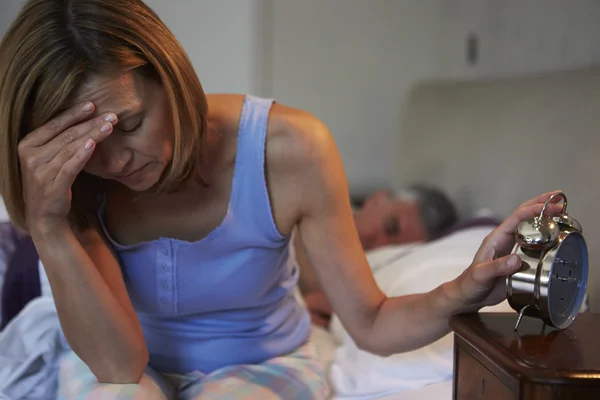Share this @internewscast.com
Discover “How Does Less Sleep Linked To Increase in Diabetes Risk in Women?” The relationship between sleep deprivation and diabetes risk in women is complex and not fully understood, but there is growing evidence that suggests a link between the two.
One theory is that sleep deprivation disrupts the body’s production of hormones that regulate blood sugar levels. For example, when you don’t get enough sleep, your body produces more of the stress hormone cortisol, which can lead to increased insulin resistance. Insulin resistance is a precursor to type 2 diabetes.

Sleep deprivation may also lead to an increase in appetite and weight gain, which are both risk factors for diabetes. Additionally, sleep deprivation can interfere with the body’s ability to use insulin effectively, which can also contribute to the development of diabetes.
A study published in the journal Diabetes Care found that women who slept less than 5 hours per night were 44% more likely to develop diabetes than women who slept 7 hours or more per night. Another study, published in the journal Sleep, found that women who had sleep apnea, a condition that causes interrupted breathing during sleep, were twice as likely to develop diabetes as women who did not have sleep apnea.
The good news is that there are things that women can do to reduce their risk of diabetes, including getting enough sleep. Most adults need around 7-8 hours of sleep per night.
The Sleep Deprivation Epidemic
In our modern, fast-paced society, sleep often becomes a casualty in the ceaseless battle for productivity. How does less sleep translate into an augmented risk of diabetes for women? To unravel this mystery, it is imperative to explore the physiological intricacies at play.
Unraveling the Mechanisms: Hormonal Havoc
The foundation of this association lies in the disruption of hormonal equilibrium induced by insufficient sleep. Leptin and ghrelin, the dynamic duo regulating appetite, find their harmony disturbed in the wake of sleep deprivation. This disharmony culminates in an augmented appetite, particularly for high-calorie, sugary fare, thereby fostering a conducive environment for the onset of diabetes.
Cortisol’s Conundrum
Linked to the increase in diabetes risk is cortisol, the notorious stress hormone. Sleep deprivation amplifies cortisol levels, thrusting the body into a persistent state of stress. This chronic stress, in turn, triggers an inflammatory response and insulin resistance—two precursors to diabetes.
Unveiling Gender Disparities

Curiously, the link between insufficient sleep and diabetes appears to be more pronounced in women. The intricate dance of hormones within the female body renders it more susceptible to the deleterious effects of sleep deprivation.
Estrogen’s Protective Veil
Estrogen, the guardian angel of metabolic health, plays a pivotal role in protecting women against diabetes. Less sleep disrupts estrogen’s delicate balance, dismantling its shield and rendering women more susceptible to the metabolic derangements that pave the way for diabetes.
The Circadian Rhythm Conundrum
Beyond hormones, the circadian rhythm, the body’s internal clock, adds another layer of complexity to this narrative. Disrupting the circadian rhythm, a consequence of inadequate sleep, impairs glucose metabolism, further amplifying the risk of diabetes.
Navigating the Sea of Research: Empirical Evidence
As we traverse this landscape of sleep and diabetes intricacies, it is paramount to substantiate our assertions with empirical evidence.
Read Related Also: Why you should NEVER wear shoes in the house…according to a doctor
The Nurses’ Health Study
The Nurses’ Health Study, a monumental undertaking spanning decades, has been instrumental in unraveling the link between less sleep and diabetes in women. The data gleaned from this extensive study underscores the heightened risk faced by women who consistently skimp on their sleep.
Polysomnography Insights
Delving even deeper, polysomnography, the gold standard in sleep research, has offered profound insights into the alterations in sleep architecture that amplify diabetes risk. The fragmentation of sleep and the reduction in slow-wave sleep emerge as key players in this intricate drama.
Mitigating the Risks: A Call to Action
Armed with the knowledge of this perilous connection, it becomes imperative to explore avenues for risk mitigation.
Prioritizing Sleep Hygiene
Elevating the importance of sufficient sleep in women’s health necessitates a cultural shift. Embracing and promoting good sleep hygiene practices, such as consistent sleep schedules and the creation of conducive sleep environments, can serve as crucial tools in this endeavor.
Stress Management Strategies
Given cortisol’s starring role in this narrative, stress management emerges as a potent weapon against the diabetes threat. Integrating mindfulness practices, exercise, and other stress-reducing techniques into daily life can contribute significantly to mitigating the risks associated with inadequate sleep.
Here are some tips for getting a good night’s sleep:
- Establish a regular sleep schedule and stick to it as much as possible, even on weekends.
- Create a relaxing bedtime routine.
- Make sure your bedroom is dark, quiet, and cool.
- Avoid caffeine and alcohol before bed.
- Get regular exercise, but avoid strenuous activity close to bedtime.
- See a doctor if you have trouble sleeping.
Getting enough sleep is important for overall health and well-being, and it can also help to reduce the risk of developing diabetes.
What Expert Says

According to the American Diabetes Association, people with type 2 diabetes who get less than 6 hours of sleep a night are more likely to have higher blood sugar levels and a greater need for insulin or other diabetes medications. They are also more likely to have high blood pressure and unhealthy cholesterol levels.
The National Sleep Foundation recommends that adults get 7-8 hours of sleep per night. However, many people do not get enough sleep. In fact, the Centers for Disease Control and Prevention (CDC) reports that about one in three adults in the United States does not get enough sleep.
There are a number of things that people can do to improve their sleep habits, such as establishing a regular sleep schedule, creating a relaxing bedtime routine, and avoiding caffeine and alcohol before bed. If you are having trouble sleeping, see a doctor to rule out any underlying medical conditions.
Conclusion: A Symphony of Factors
In conclusion, the intricate symphony of hormones, circadian rhythms, and lifestyle choices orchestrates the complex relationship between insufficient sleep and heightened diabetes risk in women. As we navigate the terrain of scientific revelations, it becomes abundantly clear that prioritizing sleep is not merely a luxury but a cornerstone of preventive healthcare.
Understanding the profound implications of less sleep on women’s metabolic health should serve as a clarion call for societal change. It is in the collective acknowledgment of the integral role sleep plays in our well-being that we pave the way for a healthier, more resilient future—one where the specter of diabetes is confronted and subdued through the empowering embrace of restorative sleep.
Note: This article is written based on scientific evidence found by the INC team. Sources are duly referenced with keywords hyperlinked to source websites and are clickable for reference.














